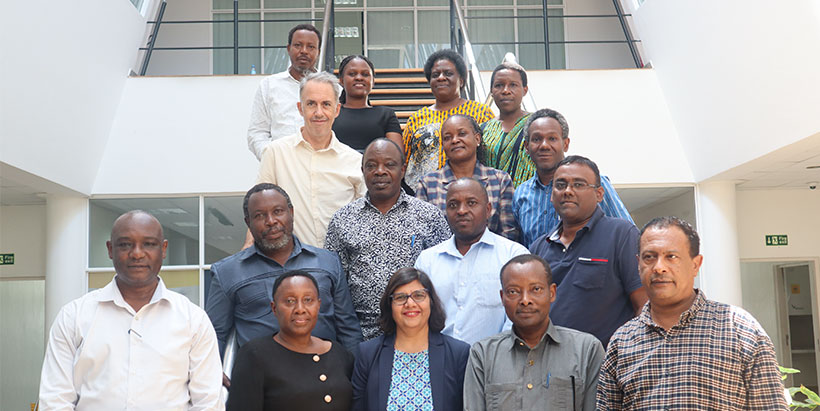December 23, 2024

The IITA and TARI team after the meeting in Tanzania. (Photo: Gloriana Ndibalema/IITA)z
To strengthen partnerships and foster agricultural research, IITA Eastern Africa hub, led by Dr Leena Tripathi, recently hosted Dr Thomas Bwana, the new Director General of the Tanzania Agricultural Research Institute (TARI). The visit provided a platform for Dr Bwana to gain insights into IITA’s ongoing projects and discuss collaborative strategies to advance Tanzania’s agricultural sector.
During the meeting, Dr Tripathi presented IITA’s core competencies, emphasizing its focus on genetic innovation, resilient agri-food systems, and systems transformation. She highlighted the hub’s work on plant health through crop improvement and seed systems, which aligns closely with TARI’s operational pillars. “When you explained TARI’s platforms, it became evident that we operate on similar frameworks. IITA collaborates with advanced institutes; for research innovation, and partner with national research organizations like TARI,” she remarked.
Discussions also centered on managing invasive plant diseases like Banana Bunch Top Disease (BBTD) and Fusarium Tropical Race 4 (TR4), which pose major threats to banana cultivation in Tanzania. Sharing updates on the progress in breeding TR4-resistant banana varieties, Dr Tripathi said joint efforts with TARI and the Tanzania Plant Health and Pesticides Authority (TPHPA) is helping to control the spread of BBTD in the country.
The importance of creating awareness and using communication to disseminate information to farmers was raised Dr Bwana suggesting the use of social media platforms like WhatsApp to connect farmers to scientists for real-time problem-solving said, “Scientists cannot be in the field every day, but if farmers are well informed about the diseases, they can easily reach out through these platforms.”
The TARI team emphasized the need to strengthen capacity-building initiatives, including skill development and refresher courses through training, scholarships, and exchange visits. “We need to improve efficiency in capacity building, particularly in areas like internships, research expertise, and effective science communication,” Dr Bwana said.
With IITA recognizing the importance of capacity development in strengthening research for development (R4D), the institute has facilitated both formal and informal training initiatives as part of its strategy to enhance food security and alleviate poverty in the region. Through its capacity development program, thousands of professionals across sub-Saharan Africa have gained valuable expertise, with countless others benefiting indirectly from the knowledge these professionals share with their communities. The objective is to enhance the capacity of partners within national agricultural research and extension systems.
Both IITA and TARI recognized the long-standing collaboration between them, while celebrating shared accomplishments and identifying areas for improvement to ensure the sustainable scaling of agricultural solutions to the smallholder farmers in Tanzania.
Reaffirming commitment to strengthening partnerships and leveraging their shared vision, both IITA and TARI will be working together to address the pressing challenges facing Tanzania’s agricultural sector and transform food systems in the country.